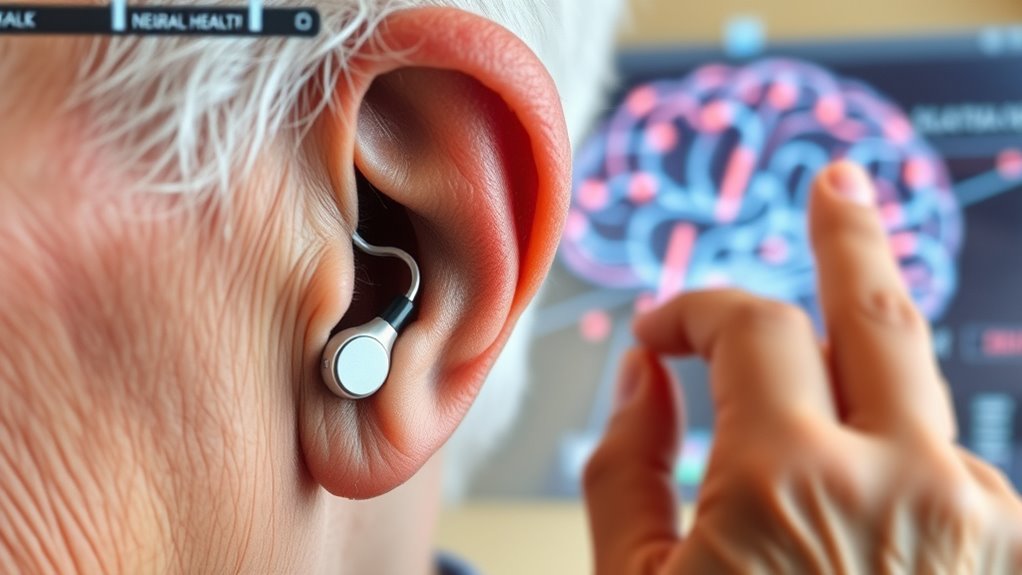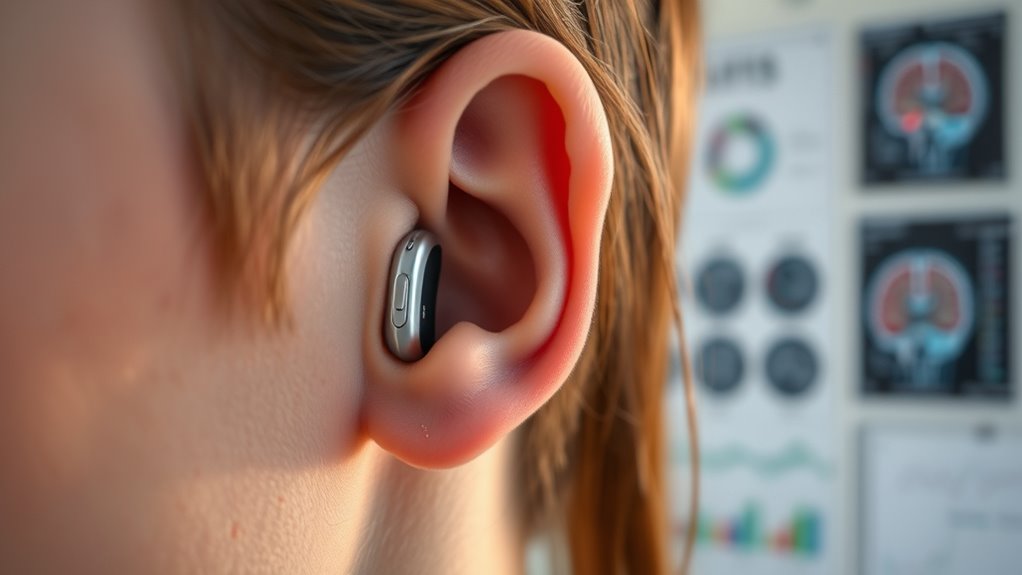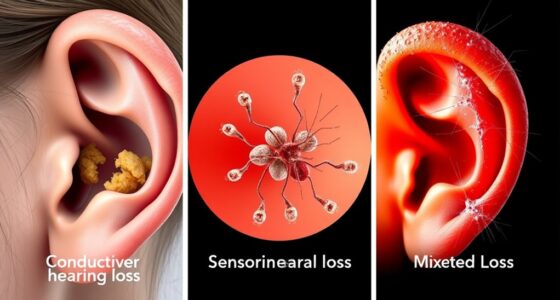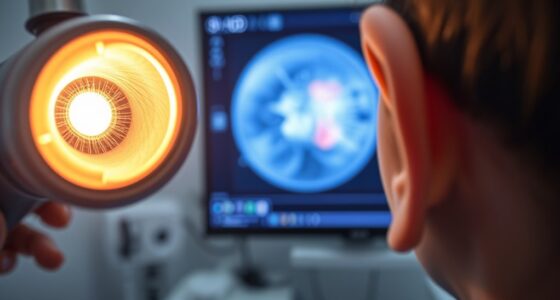Treating hearing loss early can notably lower your risk of developing dementia by supporting your brain health. When hearing declines, your brain works harder to interpret sounds, which can weaken neural pathways linked to memory and cognition. Hearing aids and other interventions improve auditory input, reduce mental strain, and help maintain social connections—key factors in preserving mental sharpness. Keep exploring how proper hearing care can protect your cognitive future and improve your quality of life.
Key Takeaways
- Treating hearing loss early preserves neural plasticity, supporting cognitive functions and reducing dementia risk.
- Addressing auditory impairments decreases cognitive load, preventing neural decline associated with untreated hearing loss.
- Hearing interventions like aids and cochlear implants enhance brain activation, promoting neural connectivity and mental resilience.
- Maintaining social engagement through hearing care reduces social isolation, a key factor in cognitive decline prevention.
- Regular hearing assessments and advanced devices enable timely treatment, safeguarding brain health over time.

IROGER Hearing Amplifier for Seniors, Personal Sound Amplifier, Smart Auto-Gain, Directional Microphone, Rechargeable with 120-Hour Battery, Headphones & Earbuds Included
Smart Auto-Gain Control – Enjoy crystal-clear sound at all times. iRoger automatically balances audio levels to enhance voices...
As an affiliate, we earn on qualifying purchases.
Understanding the Connection Between Hearing Loss and Cognitive Decline

Research shows that hearing loss doesn’t just affect your ability to hear; it can also be linked to a decline in cognitive function. When your auditory processing diminishes, your brain works harder to interpret sounds, which can strain neural plasticity—the brain’s ability to adapt and reorganize. As auditory signals become weaker, the brain reallocates resources, potentially reducing capacity for other cognitive tasks like memory and attention. Over time, this increased effort may weaken neural pathways involved in processing sound, making it harder to distinguish speech and interpret auditory cues. This ongoing challenge can contribute to cognitive decline, highlighting how closely hearing health is tied to overall brain health. Protecting your hearing helps maintain the neural flexibility essential for sharp cognitive function. Additionally, engaging in high-refresh-rate auditory and visual stimuli can help support neural resilience and maintain cognitive sharpness. Recognizing the importance of neural plasticity emphasizes the need to address hearing issues early to preserve brain health over time. Regular hearing assessments and timely interventions can bolster brain adaptability and mitigate potential cognitive decline. Moreover, research indicates that treating hearing loss with hearing aids or other devices can directly contribute to cognitive preservation and overall mental well-being.

Joanbro Personal Sound Amplifier for Seniors, Voice Enhancement Devices, Pocket Sound Amplifiers for Elderly People, Adults, 50dB Gain, with Headphones & Earbud, 3 Types Mics, 3 Tone, Volume Control
SUPERIOR PERSONAL SOUND AMPLIFIER: Applying noise cancelling, automatic gain control and advanced amplifying circuit, this sound amplifier device...
As an affiliate, we earn on qualifying purchases.
How Hearing Impairment Impacts Brain Function

When you have a hearing impairment, your brain works harder to process sounds, increasing your cognitive load. This extra effort can activate different brain areas, which may impact overall brain function. Additionally, hearing loss often leads to reduced social interactions, further affecting your brain’s health. Trust issues with social engagement can also contribute to cognitive decline over time. Moreover, studies indicate that untreated hearing loss can accelerate brain atrophy, compounding the risk of dementia. Recognizing the connection between hearing and cognition highlights the importance of addressing hearing health proactively. Incorporating AI-driven auditory assistance devices may help reduce this cognitive strain and support brain health.
Cognitive Load Increase
Hearing impairment forces your brain to work harder to interpret sounds, which increases cognitive load and diverts resources from other mental tasks. When your brain is constantly trying to decode unclear sounds, it has less capacity for memory, reasoning, or problem-solving. This overload can accelerate cognitive decline over time. Using hearing technology, like hearing aids, can reduce this strain by making sounds clearer. Auditory training also helps your brain adapt more efficiently, easing the processing burden. By improving sound clarity and strengthening neural pathways, these interventions help lower cognitive load. Additionally, automation in healthcare is increasingly used to develop personalized auditory therapies that support brain health. Understanding how spiritual energy influences mental resilience may offer new insights into holistic approaches for cognitive support. Moreover, research into AI safety measures emphasizes the importance of monitoring AI behavior to ensure safety, which parallels the need for careful management of cognitive health strategies. As a result, your brain can focus on higher-level tasks rather than decoding muffled conversations, supporting overall brain health and potentially reducing dementia risk.
Brain Area Activation
Hearing impairment prompts your brain to activate multiple areas beyond those involved in normal sound processing, leading to increased neural effort. When your auditory signals are weaker or distorted, your brain works harder to interpret sounds, engaging regions like the auditory cortex more intensely. This heightened activity reflects the brain’s neural plasticity, as it adapts to compensate for reduced hearing input. Over time, this increased activation can cause reorganization in brain networks, affecting how other cognitive functions are managed. Instead of focusing solely on auditory processing, your brain distributes resources across different regions, which may impact overall efficiency. Additionally, neural plasticity allows the brain to reorganize itself in response to sensory deficits, but prolonged adaptation may lead to cognitive strain. This shift underscores how hearing loss influences broader brain function, emphasizing the importance of addressing hearing impairment to maintain healthy neural activity. Recent studies also suggest that addressing hearing loss early can help preserve brain health and reduce the risk of cognitive decline.
Social Engagement Decline
As your brain reallocates resources to compensate for impaired auditory input, it often results in reduced social engagement. When hearing declines, conversations become more challenging, leading you to withdraw from social interactions. This social isolation can deepen feelings of loneliness, negatively affecting your emotional well-being. Over time, a lack of social contact may impair brain function, increasing dementia risk. Hearing loss can also cause frustration and anxiety, further discouraging social participation. Maintaining active social connections helps keep your brain engaged and supports emotional health. Addressing hearing impairment early can prevent social withdrawal, preserving social engagement and emotional well-being. By prioritizing hearing health, you not only improve communication but also protect your brain’s resilience against cognitive decline.

Neosonic Rechargeable Hearing Amplifier to Aid TV Watching and Conversation, Wireless Neckband Headphones for Seniors & Adults, Remote Microphone Noise Cancelling - NW10 Pro
BACKGROUND NOISE REDUCTION - Equipped with a wireless external microphone, the NW10 Pro allows you to place the...
As an affiliate, we earn on qualifying purchases.
The Science Behind Auditory Degradation and Dementia Risk

When your hearing declines, your brain works harder to interpret sounds, increasing its cognitive load. Over time, this extra effort can lead to neural decline, affecting overall brain health. Understanding this connection helps explain why auditory degradation can raise your risk for dementia. Supporting cognitive health through hearing treatment may help mitigate this risk.
Neural Decline From Hearing Loss
Emerging research shows that hearing loss can accelerate neural decline, increasing the risk of dementia. When you experience hearing loss, your brain receives less auditory input, leading to sensory deprivation. This reduction hampers neural plasticity—the brain’s ability to adapt and reorganize itself. As a result, neural pathways involved in processing sound weaken, which can affect other cognitive functions. Over time, this decline can extend beyond the auditory system, impacting memory, attention, and reasoning. The loss of auditory stimulation forces your brain to reallocate resources, often at the expense of other areas. Understanding this connection emphasizes the importance of addressing hearing loss early to preserve neural health and reduce the risk of age-related cognitive decline. Additionally, performance tuning techniques can optimize neural efficiency, much like fine-tuning an engine for better performance.
Brain’s Increased Cognitive Load
Hearing degradation forces your brain to work harder to interpret sounds, increasing its cognitive load. Instead of focusing on higher-level thinking or memory, your brain dedicates more resources to auditory processing. This constant effort strains neural pathways, making them less efficient over time. As your brain adapts, neural plasticity helps rewire existing circuits, but prolonged strain can impair this adaptability. The increased cognitive load can lead to mental fatigue, reducing your ability to concentrate and process new information. Over time, this added stress may contribute to cognitive decline and elevate dementia risk. Treating hearing loss through hearing aids or other interventions can ease this load, allowing your brain to shift resources back to more meaningful tasks and support healthier brain aging.

SuperEar Model SE5000 (PSAP) for Seniors - Hearing Amplifiers for Seniors, Super Ear Personal Sound Amplifier, Sound Amplifier Listening Device and Audio Accessories in 50dB Ambient Sounds Increase
COMPATIBILITY: Response to sound amplification is completely dependent on an individual's unique ability to detect sounds. For this...
As an affiliate, we earn on qualifying purchases.
Benefits of Early Hearing Loss Detection and Management

Detecting hearing loss early allows you to address issues before they worsen, which can considerably improve your overall quality of life. Early detection through audiology screening helps identify hearing problems promptly, enabling timely intervention. Advancements in hearing aid innovation provide more effective, discreet solutions that restore hearing and reduce cognitive strain. Managing hearing loss early also lowers the risk of social isolation and depression, supporting mental well-being. By catching issues early, you can maintain clearer communication and stay engaged with loved ones. Recognizing the connection between hearing health and brain function underscores the importance of timely treatment. Incorporating hearing aid maintenance and regular check-ups can enhance the longevity and effectiveness of hearing devices. Furthermore, understanding the Power of Imagination can motivate individuals to take proactive steps toward preserving their mental and auditory health. Additionally, protecting your hearing from environmental noise can prevent further deterioration and contribute to long-term brain health. Engaging in supportive community resources can also provide additional assistance in managing hearing health effectively.
Effective Treatments for Hearing Loss and Their Brain Health Benefits

Effective treatments for hearing loss, such as hearing aids, cochlear implants, and medical interventions, can substantially improve your hearing ability and quality of life. Modern hearing aid technology offers advanced features like noise reduction and connectivity, enhancing your listening experience. Cochlear implants bypass damaged hair cells, restoring access to sounds for severe hearing loss. Auditory training helps you adapt to new hearing devices and sharpens your listening skills, boosting brain engagement. These treatments don’t just improve hearing; they support brain health by maintaining neural connections and reducing cognitive decline. Staying proactive with these options can help preserve your cognitive functions and lower dementia risk. Neural connections play a crucial role in maintaining overall brain health, emphasizing the importance of effective hearing loss treatments.
Strategies to Incorporate Hearing Care Into Dementia Prevention

Incorporating hearing care into your overall dementia prevention plan is a proactive step that can substantially reduce cognitive decline risk. Start by scheduling regular audiology screenings to catch hearing issues early. Using advanced hearing aid technology can improve your hearing ability and stimulate brain activity, which supports cognitive health. Make hearing health a priority alongside other preventive measures like physical activity and a balanced diet. When you notice signs of hearing loss, seek prompt evaluation and treatment. Consistent use of hearing aids, when prescribed, can help preserve neural connections linked to memory and understanding. Additionally, maintaining good waterpark hotel amenities can contribute to overall well-being and stress reduction, indirectly supporting brain health. Engaging in social activities and staying mentally active are also essential components of a comprehensive approach to cognitive resilience. Incorporating hearing loss management strategies can further enhance your efforts to protect brain function. Employing brain stimulation techniques can help maintain neural pathways and cognitive sharpness. By integrating these strategies, you actively protect your brain health and reduce your chances of developing dementia.
Overcoming Barriers to Hearing Loss Treatment Adoption

Despite the clear benefits of treating hearing loss, many individuals hesitate to seek help due to various barriers. Technology barriers, such as complex devices or lack of access, can discourage people from pursuing treatment. Stigma reduction plays a pivotal role, as some may feel embarrassed or ashamed about hearing difficulties. Addressing these issues requires education and awareness to normalize hearing care. You can also explore user-friendly hearing aids and telehealth options that make treatment more accessible. Additionally, providing support networks helps reduce feelings of isolation or shame. Overcoming these barriers is essential to promote early intervention, ultimately protecting your brain health and reducing the risk of cognitive decline. Incorporating sustainable and eco-friendly solutions into hearing technology can also enhance acceptance and accessibility for environmentally conscious individuals. Embracing advances in machine learning algorithms can lead to smarter hearing aids that adapt to individual needs, further reducing barriers to effective treatment.
Future Directions in Research and Public Health Initiatives

As research continues to uncover the links between hearing health and brain function, public health initiatives are increasingly focusing on early detection and prevention strategies. Technological innovations, such as advanced hearing aids and screening tools, are making it easier to identify hearing loss early and intervene promptly. Policy development plays a vital role in establishing guidelines for routine hearing assessments and integrating hearing health into overall brain health programs. Future research will likely explore how these technologies can be scaled and personalized to maximize benefits. You can expect continued collaboration between scientists, healthcare providers, and policymakers to create exhaustive approaches. These efforts aim to reduce dementia risk by prioritizing hearing health, ultimately improving quality of life and cognitive longevity across populations.
Frequently Asked Questions
How Does Untreated Hearing Loss Specifically Increase Dementia Risk?
Untreated hearing loss can lead to neural deterioration because your brain works harder to process sounds, which can cause cognitive decline over time. When you don’t address hearing issues, your brain may start to reorganize, losing connections to auditory areas. This increased mental effort and neural change raise your risk of developing dementia, as your brain’s ability to function efficiently diminishes with ongoing hearing challenges.
Are There Age Groups Most Affected by Hearing-Related Cognitive Decline?
You might notice that age-related decline in hearing affects older adults more essential, making them more vulnerable to cognitive issues. Early detection is key, as catching hearing loss early allows you to take steps that could slow or prevent decline. While all age groups can experience hearing challenges, it’s especially vital for seniors to prioritize hearing health, because maintaining good hearing can help protect their brain health as they age.
Can Hearing Aids Fully Prevent or Reverse Dementia Symptoms?
Did you know that hearing aids can improve cognitive function, but they don’t fully prevent or reverse dementia symptoms? While they help you hear better and may slow cognitive decline, hearing aid limitations mean they aren’t a complete solution. You should view them as part of a broader approach to maintaining brain health, including social engagement and mental exercises. So, don’t rely solely on hearing aids for cognitive improvement.
What Role Does Social Engagement Play in Hearing Loss and Brain Health?
Social interaction and community involvement are essential for maintaining your brain health, especially if you’re experiencing hearing loss. Engaging with others helps stimulate your brain, improves cognitive function, and boosts your overall well-being. When you participate in social activities, you reduce feelings of isolation, which can negatively impact your mental health. So, prioritize social engagement to support your hearing health and help protect your brain from decline.
How Can Caregivers Support Individuals With Hearing Loss to Protect Cognition?
You can support individuals with hearing loss by implementing effective communication strategies, like facing them directly and speaking clearly. Encourage environmental modifications such as reducing background noise and improving lighting to enhance understanding. Be patient, listen actively, and make certain they feel comfortable expressing their needs. These actions help preserve cognition by making communication easier, reducing frustration, and promoting social engagement, which is essential for their overall brain health.
Conclusion
By addressing hearing loss early, you can markedly lower your risk of developing dementia—studies show that untreated hearing impairment increases dementia risk by up to 50%. Taking action now not only improves your hearing but also supports your brain health for the long term. Don’t wait—prioritize hearing care to protect your cognitive future and enjoy a richer, more connected life. Your brain will thank you for the proactive step.










